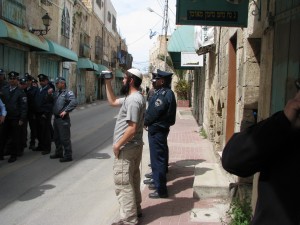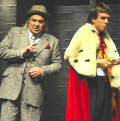A guest post from Elliott Horowitz
On a chilly morning in March I boarded a bus in Jerusalem that had been chartered by a group called Shovrim Shtikah (“Breaking the Silence”) which, among its other activities, provides weekly guided tours (in English and Hebrew) to Hebron and its environs in order to show those who are unaware how difficult the lives of local Palestinians are under Israeli military occupation. The group was organized by Israeli young men who have served in the occupied territories and felt a need to “break the silence” about the activities of both the army and the settlers – especially in Hebron itself, where the freedom of movement and economic opportunities of nearly 200,000 Arabs have been severely curtailed in order to accommodate the “needs” of several hundred Jews.
The tour I had signed up for happened to be in English, and many of those waiting with me for the bus were young Europeans. I did befriend two young Israeli men who were also waiting for the bus, one of whom discovered to his consternation that I, like his parents, had voted for Meretz in the last election despite the party’s support for the war in Gaza. He was more sympathetic when I explained that I had started out in the Mafdal (National Religious Party), moved to Labor, and then (in 2006) to Meretz. None of the other people waiting for the bus showed any external signs of ever having supported a religious party. I myself exhibited no such signs either, having donned a baseball cap that morning to provide the warmth that my dwindling hair can no longer provide.
After we arrived in Hebron, however, I decided to wear my customary kippah so that both local Arabs and the police who guarded our group (from potential attack by Jewish settlers) would see that there were also religious Jews who were critical of the occupation. As we made our way by foot, accompanied by dozens of riot police (from the elite Yasam unit) down the once bustling Shuhada street, all of whose shops have been shuttered since 2000, a young bearded and befringed settler approached and began to film us with a video camera. He continued to follow us, from the other side of the street, with his camera on – as if to say, “we keep records of who you are and what you do here.” Needless to say, none of the dozens of police present thought that he was causing a provocation or disturbing the peace.
My spontaneous reaction was to take my own digital camera and cross the street, where I began taking snapshots of him from a safe distance of at least two meters, as if to say “and we keep records of who you are and what you do here.”

- Watching him watching us: A Hebron settler films Shovrim Shtikah visitors to the city
The young settler responded, as might be expected, by saying “you people are the worst,” but I was more surprised when some of the police ordered me to cross the street and return to my group. I protested, saying that I like the video photographer was an Israeli Jew, and like him I had both a kippah and tzitzit – which I promptly pulled from under my shirt.
Read more








